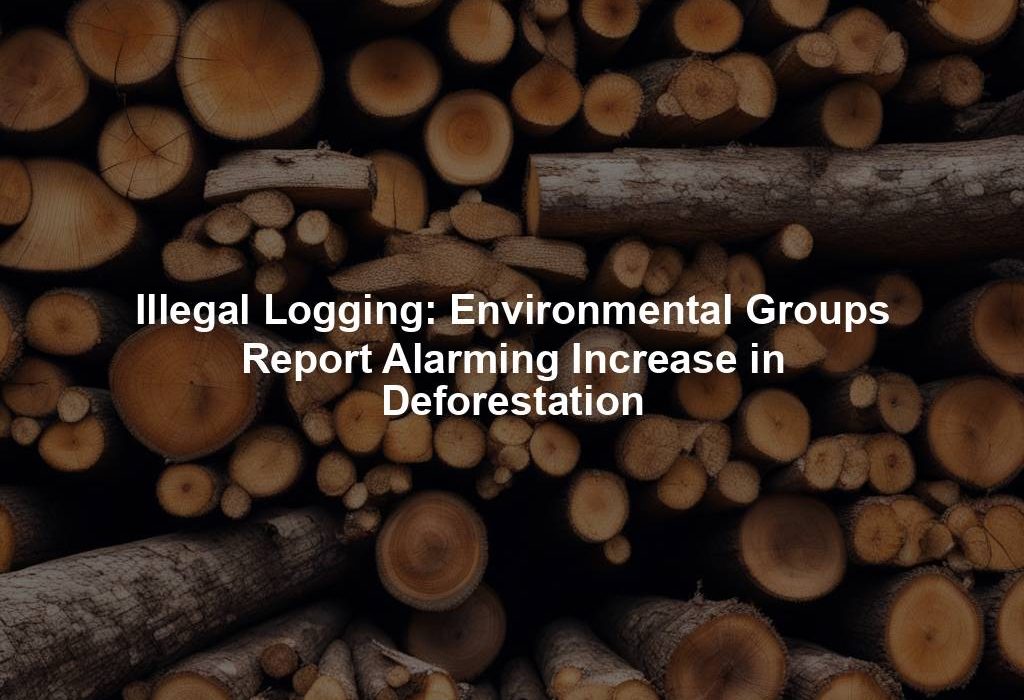The heart-wrenching truth of illegal logging is unraveling before our eyes, causing irreparable damage to the world’s forests. Recent reports from environmental groups are painting a dire picture of the escalating deforestation crisis, raising profound concerns about the long-term consequences of this destructive practice.
The World Wildlife Fund (WWF) grimly highlights the devastating toll of illegal logging, leading to the loss of approximately 10 million hectares of forest each year. These staggering numbers not only threaten biodiversity and carbon storage but also jeopardize the livelihoods of countless individuals reliant on forests for survival. This widespread issue fuels corruption, subverts legal frameworks, and perpetuates poverty in some of the planet’s most fragile regions.
Behind the stark statistics lies a chilling narrative of greed and exploitation. The incessant demand for cheap timber in global markets, spearheaded by major importers like the United States, the European Union, China, and Japan, drives this destructive cycle. Shockingly, up to 80% of timber exports from certain regions are illicitly sourced, revealing the dark underbelly of an industry that thrives on environmental disregard.
Environmental champions such as Greenpeace, the Rainforest Action Network, and the Environmental Investigation Agency delve deep into the heart of darkness, shedding light on the nefarious activities of illegal loggers. Through covert operations, satellite surveillance, and on-the-ground research, these organizations unmask the extent of the devastation in countries like Brazil, Indonesia, the Democratic Republic of Congo, and Russia.
Brazil’s Amazon rainforest, an ecological treasure trove revered as the “lungs of the Earth,” stands at the frontline of this environmental crisis. Despite its critical role in sustaining global biodiversity, the Amazon faces relentless assault from illegal logging and deforestation, fueled by shortsighted policies prioritizing economic gain over environmental preservation.
Greenpeace’s recent findings expose a harrowing reality in Brazil, with a shocking 9.5% spike in deforestation rates, amounting to 11,088 square kilometers lost in 2020 alone. Illegal loggers and land grabbers operate with impunity, exploiting weak enforcement mechanisms to ravage this precious ecosystem, jeopardizing not just wildlife but the delicate balance of our planet.
Indonesia’s Papua province harbors another grim tale of illegal logging, imperiling biologically diverse forests vital for endangered species like orangutans and Sumatran tigers. The Rainforest Action Network takes a stand alongside local communities, documenting and reporting illicit activities to safeguard these precious ecosystems and the livelihoods they sustain.
The Democratic Republic of Congo echoes a haunting refrain, with illegal logging acting as a primary driver of deforestation in the majestic Congo Basin. Here, armed militias and corrupt officials collude with logging entities, perpetuating a cycle of exploitation that endangers iconic species like forest elephants and gorillas, as well as the indigenous communities reliant on these forests for their very existence.
In Russia’s sprawling Siberian wilderness, illegal logging casts a long shadow over the vast boreal forests, with criminal syndicates operating brazenly to profit from timber trade crimes. The Environmental Investigation Agency’s exposés unveil a landscape tainted by corruption and deficient enforcement, underscoring the urgent need for governmental intervention to safeguard these critical ecosystems.
The sobering truth exposed by the Environmental Investigation Agency reverberates globally, revealing that a staggering 30% of traded timber worldwide originates from illegal sources, valued at over $100 billion annually. This illicit trade not only undermines sustainable forest management but perpetuates poverty and environmental degradation in regions teeming with biodiversity.
Cries for action reverberate through the ranks of environmental advocates, urging governments, corporations, and consumers to stand united against illegal logging. Strengthened enforcement of environmental legislations, transparency in supply chains, and support for community-led forest conservation initiatives are pivotal steps in curbing this menace.
Consumers too hold a key to change, by consciously opting for sustainably sourced products bearing certifications like the Forest Stewardship Council (FSC) or the Programme for the Endorsement of Forest Certification (PEFC). Through informed choices and backing environmentally responsible companies, individuals can chip away at the demand for illegal timber, nurturing a culture of conscientious forest stewardship.
Illegal logging isn’t just a crime against nature; it’s a poignant reminder of our collective responsibility to safeguard the future of our planet. Only through a unified front encompassing environmentalists, policymakers, businesses, and citizens can we combat this ecological menace, preserving our forests, protecting biodiversity, and upholding the rights of indigenous communities. Together, let us forge a path towards a sustainable, equitable future, where forests thrive, and harmony with nature prevails.




